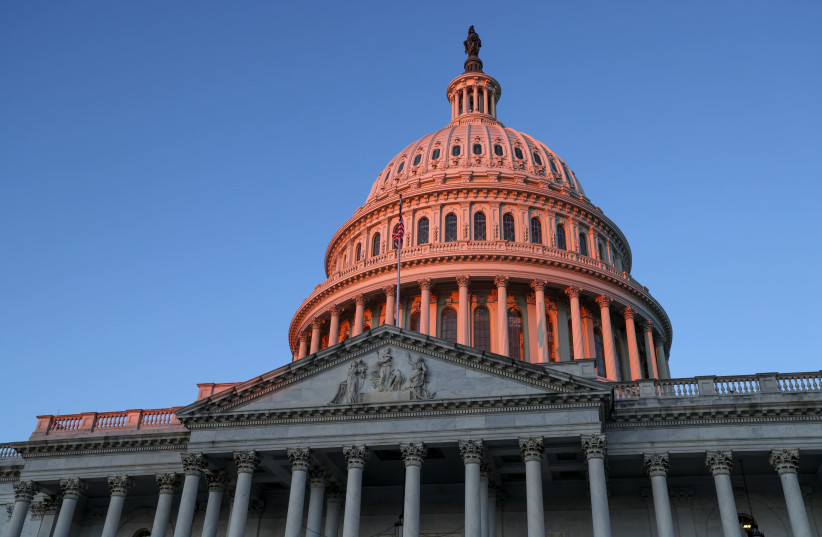In recent months, against the backdrop of the challenges of the war in Gaza and Iran’s negative role in the Middle East, various opinions and approaches regarding Israel-US relations have been voiced.
These opinions vary due to the climate and political circumstances, both domestically in the United States and in Israel, alongside the potential for strategic change in the balance of power, on the global stage and in the Middle East. Decisions and steps taken by both sides at this time will significantly impact Israel’s standing and its strategic, security, and technological position, both now and in the long term.
Amid reports of the US administration’s moves to provide additional aid to Israel following Iran’s direct attacks, there is a noticeable shift in sentiment in Congress regarding legislation for additional military aid to Israel.
At the core of this shift is the understanding, mainly within the Republican party, that expanded security assistance to Israel is needed to confront its challenges and that it is vital to distinguish this issue from other political considerations (such as aid package for Ukraine and Republican opposition to any initiative from the Democratic Administration).
The adoption of the aid package legislation in both houses of Congress indicates that support for Israel remains strong and that when the time comes, the American government and Congress stand by Israel. Furthermore, the escape from the political “quagmire” after prolonged stalemates and amidst election turmoil demonstrates the resilience of the “special relationship” and partnership between Washington and Jerusalem.

Looking at the broader context
However, it is crucial to view this current positive momentum in a broader context and address deeper processes in the US that pose a challenge to the partnership between the countries. These include demographic changes in American society and adjustments in American priorities and interests (beyond party lines) in light of competition with China and the American imperative to maintain a technological advantage globally. These adjustments reflect a potential shift in Israel’s perception as an asset for the US.
It is, therefore, essential to translate the current positive momentum into deepening strategic partnerships, while injecting additional content and anchoring them in formal agreements. This will make it difficult to roll them back in the future, in the event of a negative change regarding Israel. The multidimensional partnership between Israel and the US and its formal anchoring also gains significance as the systemic rivalry in the international geopolitical arena intensifies, and Israel needs to continue ensuring Washington’s diplomatic support alongside its role as a strategic asset for Israel.
In a reality where the strategic positioning of the US is determined and shaped amid competition for technological supremacy (AI and quantum) and control over supply chains, trade routes, and resources, the Israeli business sector plays a key role in illustrating Israeli assets for the US. The contribution of Israeli companies to Washington’s efforts to maintain America’s competitive edge creates an opportunity for collaboration through the establishment of joint ecosystems in innovation and emerging technologies.
Now, more than ever, increasing commercial activity and partnerships between the countries will enable Israel to develop advantages that strengthen its competitive position in global markets, against its security challenges in the region – and facilitate economic recovery. Despite S&P’s forecast of low growth in 2024, it is vital to promote economic agreements, encourage investments, and create cooperation between companies and entities in both countries.
One way to deepen economic-business partnership between the countries is to study the economic-technological trends led by the Biden administration, and in particular, the “Bold goals” for the next 20 years as part of the Bioeconomy vision (published on March 23). This plan includes, among other things, goals in climate (convert to recyclable-by-design polymers); food and agriculture (reduce methane and greenhouse gas emissions); health (increase the manufacturing scale of cell-based therapies; sequence the genomes of one million microbial species); and resilient supply chains (domestic biomanufacturing infrastructure). During the past year, the US Administration has emphasized the adoption of appropriate policy, regulatory coordination, and public-private partnerships to promote the plan.
Integrating Israeli technologies in projects in the US, including under this vision, is invaluable for Israel, nationally and economically, alike. While Biden’s plans are working to strengthen domestic production in the US, Washington recognizes the limitations of becoming completely self-sufficient and will need to rely on allies as well.
These will allow Washington to better leverage global resources and capabilities, but more importantly (and perhaps primarily), help counter Chinese technological dominance worldwide and prevent technology transfer to Beijing.
For Israel, the opportunity arises to deepen strategic cooperation with its most important ally and with other partner countries, including in the region, facing environmental challenges and in need of breakthrough technologies to find solutions.
The writer is director of strategy at the Israel-America Chamber of Commerce.
